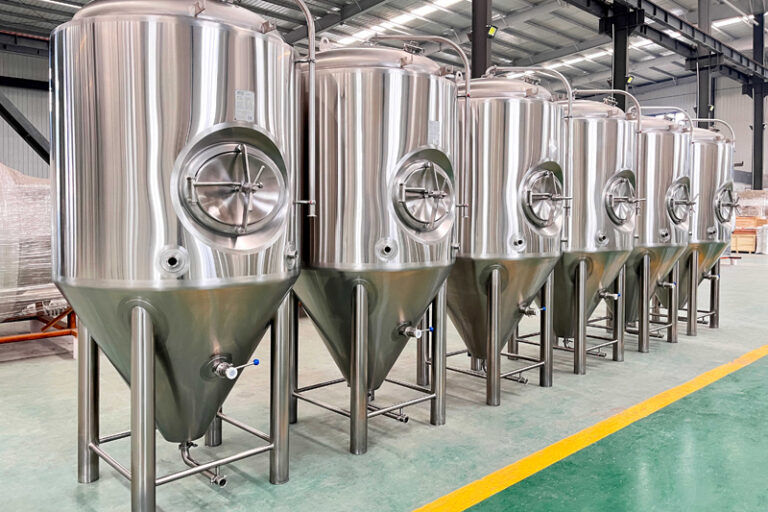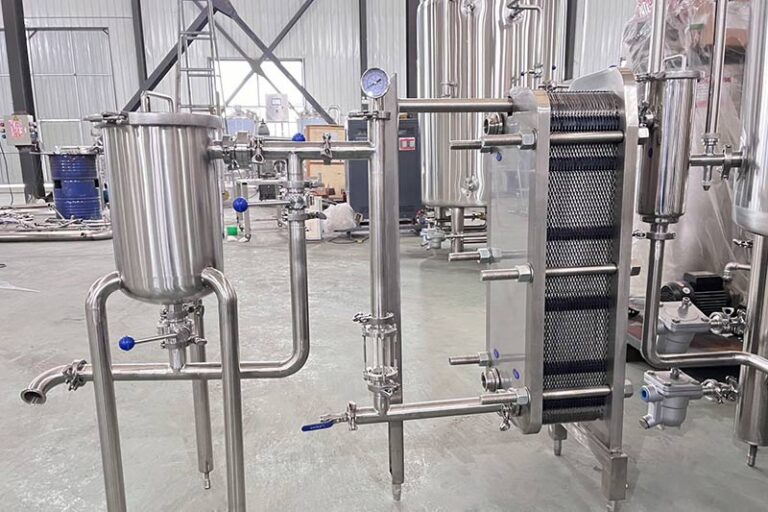In the beer brewing process, the fermentation tank is an indispensable core equipment, and controlling the fermentation temperature is one of the best measures that homebrewers can take. Each yeast strain has a temperature range in which it performs best, and keeping the fermentation temperature within the preferred range of the yeast strain will produce the best results. When the yeast fermentation temperature is too high, it will often produce an unpleasant plastic taste, excessive esters, or rubbing alcohol taste and aroma. If the yeast fermentation temperature is too low, it may stop functioning completely and enter a dormant state, resulting in incomplete fermentation and beer that is too sweet. Depending on the ambient temperature of the fermentation area, you may need to heat or cool the fermentation tank to maintain the optimal temperature.
Table of Contents

Basic knowledge of fermentation
Before we delve into the reasons why fermenters heat up, it’s important to understand the basic principles of fermentation itself. Fermentation is a fascinating biological process that humans have used for centuries to produce a variety of food and beverage products. It is carried out by microorganisms (mainly yeast), which consume sugar molecules and release alcohol and carbon dioxide as by-products. This process occurs within a specific temperature range, which significantly affects the flavor and aroma of the final product.
Yeast strains play a vital role in the fermentation process. These microorganisms have the incredible ability to convert simple sugars into alcohol and carbon dioxide through anaerobic respiration. Different yeast strains have unique properties that affect the fermentation process and the resulting flavor.
Effect of temperature on the fermentation process
Consequences of overheating the fermentation temperature
- Effect on yeast vitality: High temperature has a great impact on yeast vitality. Overheating can cause stress to yeast cells, resulting in decreased vitality and impaired fermentation. This can lead to incomplete sugar conversion, off-flavors, and a lack of desirable aroma compounds. Maintaining the proper fermentation temperature is critical to ensuring yeast health and successful fermentation.
- Effect on flavor: Overheating during fermentation can significantly change the flavor profile of the final product. High temperatures promote the production of undesirable off-flavors, such as fusel alcohols, which can cause a pungent solvent taste in beverages. In addition, overheating can cause volatile aromas to evaporate, resulting in the loss of desired aromatic compounds. The temperature must be carefully controlled to obtain the desired flavor profile.
Consequences of too low a fermentation temperature
- Delayed fermentation: At too low a temperature, the activity of the yeast will be inhibited, resulting in difficulty in starting the fermentation. If the temperature is too low, the yeast may not be able to carry out metabolic activities effectively, and thus fail to start the fermentation process.
- Affect beer flavor: Low-temperature fermentation may cause changes in the flavor of the beer. For example, for ale beer that requires a certain degree of fat and fruit flavor, too low a fermentation temperature may cause the flavor of the beer to be too clean or light and fail to achieve the expected flavor characteristics.
- Increased risk of contamination: At too low a temperature, although the activity of decay bacteria and wild microorganisms will also decrease if the temperature is not properly controlled or there is a source of contamination in the fermentation environment, these microorganisms may still multiply and contaminate the beer.
Advantages of fermentation tank temperature control
- Precise control: Since temperature is very sensitive to the fermentation process, we need to use a precise temperature control system to monitor and adjust the temperature in the fermentation tank in real time to ensure that it fluctuates within the optimal range.
- Stability: In addition to precise control, we also need to maintain the stability of the temperature in the fermentation tank. Avoid large temperature fluctuations that hurt the growth and metabolism of microorganisms.
- Flexibility: Different brewing products may require different fermentation temperature ranges, so we need to flexibly adjust the temperature of the fermentation tank according to specific brewing processes and product requirements.
- Safety: In the process of adjusting the temperature, we also need to pay attention to safety issues. For example, when using heating or cooling equipment, we must prevent overheating or overcooling from causing equipment damage or safety accidents.

Importance of Temperature Regulation
Maintaining proper fermentation temperature is critical for yeast health, fermentation efficiency, and flavor development. Temperature control allows for better control of fermentation dynamics, ensuring the desired flavor is produced while minimizing the risk of off-flavors caused by high temperatures.
Yeast health is critical to a successful fermentation. By keeping the temperature within an optimal range, yeast cells remain active and healthy, allowing for a more efficient fermentation process. This means the yeast can consume sugars more efficiently, resulting in higher alcohol content and better extraction of flavor from the raw materials.
In addition, temperature regulation affects the production of esters and other flavor compounds. Different yeast strains produce different flavors at different temperatures. By carefully controlling temperature, winemakers and enologists can control the flavor profile of the final product. For example, lower fermentation temperatures may produce a cleaner, crisper flavor, while higher temperatures may produce a fruitier and more complex flavor.
Tips for maintaining optimal temperature
Automated temperature control system
Modern fermenters are usually equipped with advanced automated temperature control systems. These systems monitor the temperature in the fermenter in real-time through temperature sensors and transmit data to the control system. The control system automatically adjusts the working state of the heating or cooling equipment according to the preset temperature range and fluctuation range to maintain the temperature in the fermenter stable.
Physical adjustment method
- Ice bath method: suitable for small or conical fermenters. Immerse the fermenter in a bathtub filled with ice cubes or ice water, and reduce the temperature of the fermenter by the heat absorption of ice water. It should be noted that ice cubes or ice water cannot directly contact the surface of the fermenter to prevent local overcooling.
- Heating device: For situations where the temperature needs to be increased, a heating device (such as an electric heating rod, a steam heating tube, etc.) can be installed around or at the bottom of the fermenter to increase the temperature of the fermenter by heating. It should be noted that the heating speed and temperature gradient should be controlled during the heating process to prevent overheating or uneven temperature.
- lInsulation material: Wrap a layer of insulation material (such as foam plastic, asbestos, etc.) on the outside of the fermenter to reduce the influence of the external temperature on the temperature in the fermenter. This method is suitable for occasions where the ambient temperature fluctuates greatly.
- Fan and wet cloth: For situations where natural cooling is required, fans can be placed around the fermenter and covered with wet cloth. The blowing action of the fan can accelerate the evaporation of water on the wet cloth, thereby taking away heat and lowering the temperature. Although this method is simple, the effect is limited and requires continuous operation.

FAQ
What is the importance of temperature regulation in fermenters?
How to determine the optimal temperature range for fermenters?
The optimal temperature range is usually determined by the type of microorganism used, the brewing process, and the characteristics of the target product. In general, yeast has higher activity between 15°C and 30°C, but the specific temperature needs to be adjusted according to the characteristics of the strain and brewing requirements.
How does temperature affect the fermentation rate?
As mentioned earlier, the fermentation rate will increase with increasing temperature, thereby improving the efficiency of sugar conversion and producing more by-products. In some cases, this increase in activity can be beneficial, but if not managed properly, it can also lead to the formation of off-flavors or other problems.

